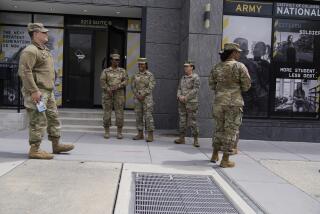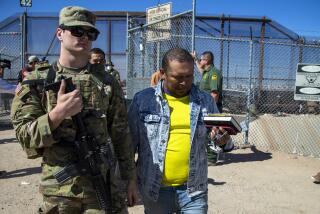As Calm Settles Over Balkans, NATO to Withdraw 12,000 Peacekeepers
VIENNA — With the situation in the Balkans more stable than in several years, NATO announced Friday that it is cutting its troops by 12,000, about 20% of the total force in the region.
The largest reduction is to be in Bosnia-Herzegovina, which is to lose about a third of its peacekeepers by year’s end, reducing by 7,000 troops the current total of 19,000.
In Kosovo, where the situation is less stable, troop strength would drop by about 4,800, leaving approximately 33,200 soldiers in the ethnic Albanian-majority province of Serbia, the main republic of Yugoslavia.
In Macedonia, where there has been sporadic fighting, there are about 700 North Atlantic Treaty Organization troops.
Taken together, however, the cuts are among the largest in the multinational peacekeeping forces in the region since the first soldiers came into Bosnia in 1996, according to NATO officials.
Peacekeepers arrived in Kosovo after the 1999 NATO-led air campaign against the regime of former Yugoslav President Slobodan Milosevic, whose forces expelled hundreds of thousands of ethnic Albanians and are estimated to have killed more than 10,000.
Since the former Yugoslav federation began to break apart in 1991, the region has been plagued by a series of violent ethnic and religious wars, which in Bosnia killed more than 200,000 people.
The most recent conflict was last summer’s fighting in Macedonia between ethnic Albanians who said they wanted more rights and the ethnic Macedonians who dominate the country.
The reaction to the announcement of the troop reduction from Balkan analysts and government officials was muted, in part because the situation is calmer and because NATO appears still committed to keeping a large number of troops on the ground for years to come.
“It’s difficult to escape two conclusions: There is a devaluation of Southeastern Europe ... and conditions have stabilized considerably in Bosnia, and in Kosovo they are inching towards normality,” said Simon Serfaty, director of the European program at the Center for Strategic and International Studies in Washington.
The Bosnian Foreign Ministry said the NATO downsizing was “in line with NATO’s decision to harmonize its presence in Bosnia with new circumstances” and added that officials had been assured that Balkan security would continue to be a NATO priority.
President Bush and Defense Secretary Donald H. Rumsfeld had previously pushed hard for a sharp reduction in the number of American troops in the region and more involvement by Europeans, but that seems to have moderated somewhat since Sept. 11 with the discovery of a likely Al Qaeda cell in Bosnia.
The discovery underscored the need for intensive intelligence gathering in the region. Bosnia, whose population is roughly half Muslim, has several hundred moujahedeen fighters who have lived in the region since the 1992-95 ethnic warfare in the country. Some of them are believed to be radical and potentially supporters of terrorist activities. In addition, the nation has porous borders, making it easy for people to enter and leave.
Six foreign nationals, including an Algerian who reportedly was in communication with a key lieutenant of Osama bin Laden, were arrested earlier this year and flown to the U.S. base at Cuba’s Guantanamo Bay for questioning.
There have been a series of terrorist threats against the U.S. and British embassies in Sarajevo, the Bosnian capital, that were serious enough to force the closing of both missions. In addition, the Bosnia Stabilization Force, or SFOR, has been involved in searching several Islamic charities that operate in the country for information related to terrorist activities.
“As long as you keep the key intelligence functions in Sarajevo, there is room for troop reductions,” said Mark Wheeler, Bosnia director of the International Crisis Group, a Brussels-based organization that studies conflict.
About 3,000 U.S. soldiers are serving in Bosnia, and Pentagon officials have said privately that they expect a reduction roughly proportional to the overall troop reduction in the country, or about a third of the U.S. force. The number of U.S. troops leaving Kosovo was not yet clear.
The troop reductions will be complete by the end of 2002, but other streamlining could continue into 2003, NATO officials said.
More to Read
Sign up for Essential California
The most important California stories and recommendations in your inbox every morning.
You may occasionally receive promotional content from the Los Angeles Times.










